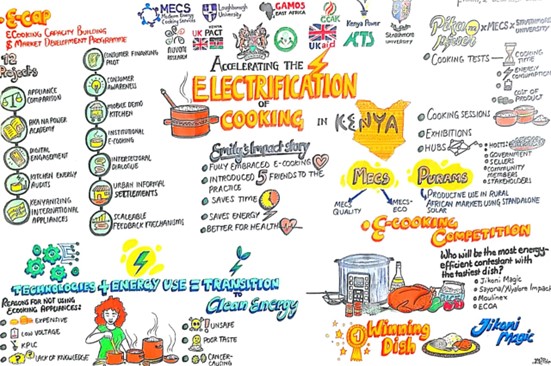
- Date
- 17th March 2023
- Categories
- Clean Cooking
By Syprose Ochieng (Gamos East Africa), Beryl Onjala (Gamos East Africa), Dr Jon Leary (Gamos East Africa), Dr Faith Wandera-Odongo (Ministry of Energy and Petroleum)
This is the final post of a five-part blog series focusing on the events during the 3rd clean cooking week co-hosted by Clean Cooking Association Kenya (CCAK) and the Ministry of Energy and Petroleum (MoEP) at Panari Hotel Nairobi from 28th November to 2nd December 2022. On the 2nd of December 2022, the MECS, Gamos East Africa, Nuvoni Centre for Innovation and Research, Africa Centre for Technology Studies (ACTS), Energy Research Centre-Strathmore University, and Kenya Power and Lightning Company (KPLC) were joined by over 70 clean cooking participants and stakeholders at the Kenya Power and Lighting Company (KPLC) Pika na Power Demonstration Centre for an electrifying session moderated by Beryl Onjala (MECS/Gamos East Africa) and Danson Ligare (Elite Pongamia Bioenergy Project Ltd).
Watt’s Cooking
In this blog article, we aim to highlight some of the key takeaways from the engagement. The day started with participants getting to know each other better. Dr Faith Wandera (Ministry of Energy and Petroleum) opened the session by highlighting the role that eCooking plays within the clean cooking mix and touched on the ongoing development of the Kenya National eCooking Strategy. The audience also got a high-level overview of the Capacity Building and Market Development Programme (eCAP) from Dr Jon Leary (MECS/ Gamos East Africa) and Irene Wanjohi (Kenya Power).

Nuvoni Centre for Innovation Research, led by Dr Elsie Onsongo and Dr Abigael Okoko, took the audience through an exercise designed to interrogate common beliefs and perceptions around eCooking with the aid of Slido (Image 3), the Nuvoni team skillfully engaged the participants by posing questions such as ‘why don’t people use electric appliances for cooking?’. Very interesting feedback was recorded, including the ‘usual suspects’ that food cooked using electricity is not tasty, electricity is expensive when used for cooking, the appliances are costly and not available, and that a lot of food such as githeri (popular dish of maize and beans), nyama choma (roasted meat), to mention a few, cannot be prepared using electric appliances.

Another question that was posed to the participants was what types of electric appliances they owned and interestingly quite a number had purchased electric pressure cookers (EPCs) and a few had hotplates and air fryers. However, most people confessed to using them less than they could do and many reported using EPC to mainly boil cereals such as beans and Githeri. This exercise was important, especially for the work being carried out by Nuvoni on Kenya’s National eCooking Strategy. Understanding the beliefs and misconceptions held by stakeholders, provides important data for the baseline study that will support the eCooking Strategy, and will outline behavioural change strategies for addressing these misconceptions.

Emily Bolo, a research associate from the Africa Centre for Technology Studies (ACTS), also shared her experience with eCooking with the audience. She also highlighted the role that ACTS have played in catalyzing the uptake of eCooking at the county level through the County eCooking Hubs and spoke about the experiences of some of the members of the community of practice that had been directly involved in this work. It was stimulating particularly for the stakeholders to hear positive feedback on how eCooking was helping households save time, cost, and improve health for women and girls. Further to this, Sheila Chepkorir from the Strathmore Energy Research Centre (SERC) spoke about their role in engaging with the Pika na Power Programme and the MECS Programme, specifically through the development of the Pika na Power website. The role of the website is to create a platform where the various eCooking initiatives that Pika na Power is involved in, can be documented and shared for public access.

Lastly, the Pika na Power team, Wairimu Njehia (Pika na Power, Kenya Power), oversaw an eCooking competition between four groups from Sayona, Burn, Tefal, and Jikoni Magic. Following a tight competition in which all the chefs were invited to prepare a dish of their choosing using a set combination of ingredients, Jikoni Magic emerged as the winner. The food was enjoyed by the audience as seen in the pictures below and the perception that food prepared on electric cooking appliances is not tasty was obviously dispelled during this session.

By the end of the session, a lot of misconceptions and beliefs about eCooking had been dispelled. Participants were able to learn so much from the demonstrations held during the event and they were able to see firsthand how to use different appliances as showcased by the suppliers. A lot of people were thrilled to learn that there were more features on the EPC and airfyer for instance to be used and explored one participant said, “I can’t wait to reach home and try the sauté function on my EPC, I have for a long time just used it to cook Githeri and boil beans”.

It’s therefore clear that electric cooking is not expensive as presumed by many, particularly when energy-efficient appliances are used, and the food can be even more delicious than usual. This session showed that eCooking has a crucial role for Kenya in achieving the Government’s ambitious target of “universal access to modern energy cooking by 2028.”

Further reading:
Featured Image: Illustration of activities undertaken during the event. Copyright of Keeke Art. (Keeke Art)